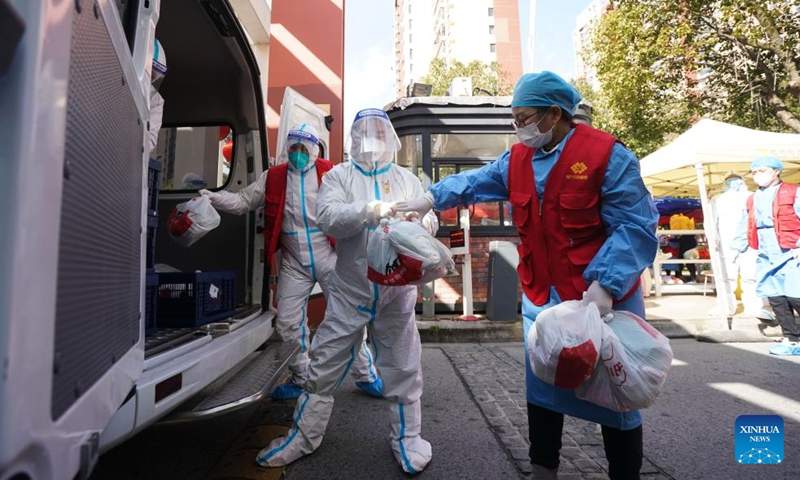
A volunteer takes vegetable packages from a staff member at Suzhou Industrial Park in Suzhou, east China's Jiangsu Province, Feb. 20, 2022.Photo:Xinhua
Electronics manufacturers in Suzhou, East China's Jiangsu Province, are seeing a limited impact on their business operations at the moment from the COVID-19 flare-ups, though disruptions in logistics and delayed shipments have occurred, industry insiders said on Tuesday.
Due to the surge of infections, Suzhou has carried out massive nucleic acid tests in Taicang, Kunshan and Suzhou Industrial Park, and it announced upgraded COVID-19 prevention and containment measures in parts of the city on Tuesday.
Industry insiders in the city told the Global Times that their operations are largely unaffected, despite some disruptions in logistics.
A manager surnamed Wang from Hui Guang Technology (Suzhou) Co, a visual equipment provider in Suzhou Industrial Park, told the Global Times on Tuesday that the general operations of his company are normal, despite some delays in logistics.
A staffer surnamed Lin from Higotech Co, another company in that region, agreed.
Lin pointed out the company has not received any government orders to work from home or other quarantine policies. He also noted that cross-provincial deliveries are delayed.
Kunshan, a subordinate city of Suzhou, is an important production center of electronics items such as printed circuit boards, panels and notebook computer components.
It is also a manufacturing base for a number of enterprises from the island of Taiwan, including Wistron Group, Unimicron and Pegatron Corp.
According to the Taiwan Stock Exchange, a total of 161 Taiwan-based enterprises had halted operations due to the COVID-19 flare-ups in Shanghai and Kunshan as of Monday.
Among them, 41 are in the electronic components business, followed by 16 companies in electrical machinery, 15 companies in computers and peripheral equipment, and 10 companies in photoelectricity.
In the Wujiang Economic Development Zone, home to major electronics plants including BOE Technology, operations are normal, but logistics issues are causing major problems.
The zone has been carrying out frequent nucleic acid tests of workers, and the living quarters are in a semi-closed status, where workers are still allowed to enter and exit the plants after presenting their health codes and negative test results, a recruiter surnamed Wang told the Global Times on Tuesday.
A major hurdle lies in logistics as vehicles from other cities are not allowed to enter the plants to pick up goods, which has prolonged the transport delays and delivery difficulties, Wang said.
Due to the stagnant logistics, labor demand from the electronics plants has dropped and some even reduced their recruitment by half compared with the same time last year, Wang said.
However, the impact is limited as the factories are not in their peak season, which usually comes in July and August, Wang added.
From 12 am on Wednesday, some of the areas in the Suzhou Industrial Park will start to enter sealed-off management.
Kunshan will implement four-tiered targeted epidemic prevention measures based on the degree of risks and the distribution of positive infections after finishing seven days of sealed-off management.
Authorities in Suzhou said that strict control measures will be taken in areas hit by COVID-19, while ruling out a city-wide lockdown.
Suzhou added 31 new positive COVID-19 cases as of 3 pm on Tuesday.

